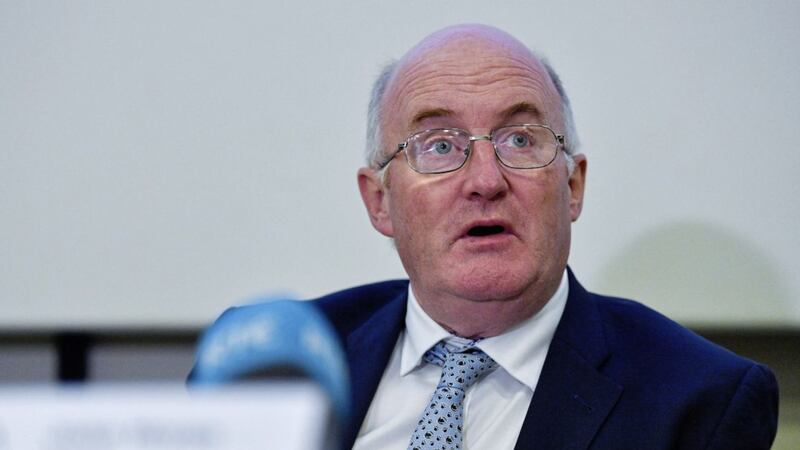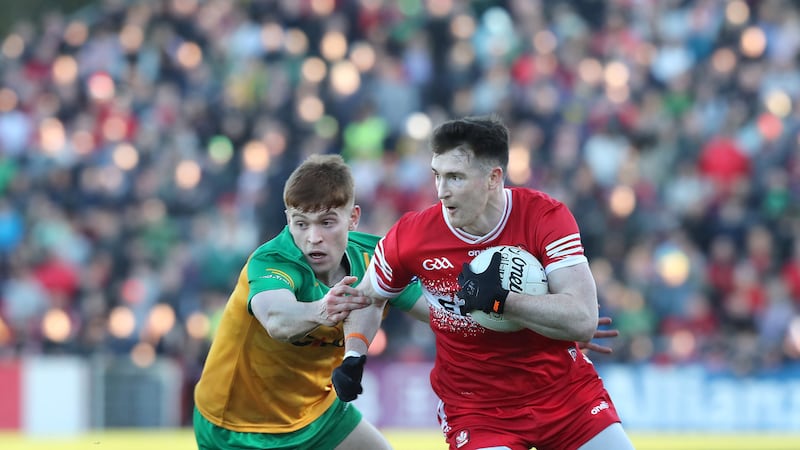THE GAA’s Fixtures Task Force did not put forward a proposal that involved abolishing the provincial championships because “the time was not right to do it”.
In a survey undertaken by the body, 46 per cent of the 1,300 respondents said that they would be in favour of abolishing the provinces, which have long been viewed as a barrier to correcting many of the organisation’s fixture ills.
But in putting forward its findings in Croke Park yesterday, the two options to change the structure of the All-Ireland SFC involved either redrawing the balance into four groups of eight, or moving the provincial championships to a window early in the year.
“We had a big debate about this,” said Sullivan.
“If we had gone the other way, people will be wondering why we did that. It was one those judgement calls that we made, and we felt that on balance that the time was not right now to do it, we didn’t feel happy enough in our skin to do it.”
It also turned away the option to split the fixtures calendar down the middle, with the All-Ireland finals taking place in July. Of the five options that the task force considered, which were revealed in The Irish News in September, there were traces of four in the final plans.
The only one which was not considered to be put before clubs and counties over the coming months before an expected Special Congress vote in April or May next year was the split season.
The task force’s report said that despite the “clear advantage” of the idea being that there would be no crossover between club and inter-county seasons, and therefore no ambiguity over player availability, it “concluded that it would not be the best solution for the fixture challenges faced by the GAA.”
“From a scheduling perspective, it would allow club fixture makers to provide much more regularity and certainty to fixture programmes in counties, something that club players continuously seek,” read the report.
“However, there are a number of obvious challenges presented by this approach also.
“Firstly, separating players entirely from their clubs for over half the year would not be desirable. County players need to stay connected to their community and need breaks from the inter-county setup. Neither would clubs be likely to support such a move – whatever the drawbacks of the current “windows” approach might be, at least it ensures some visibility of the county player with his club in the spring.
“Secondly, any such move would require playing the All-Ireland finals at the end of June (or mid-July at the latest). In a promotional context, this would be in the best interests of the association overall. It would mean over half the season without any inter-county GAA action.
“But most importantly, having looked at various samples of how a split season might work, the Task Force did not see how any extra weekends for the club game (between the end of April and the commencement of provincial club championships in October) would be created by doing so.”
Instead, the task force has put forward two options, both of which come with two potential fixture schedules.
The first option is to rebalance the provincial championships by tinkering with them so that there are eight teams involved in each of the four competitions.
While there is no set mechanism for deciding which counties would move from one province to the other, the report does suggest determining the moves by virtue of final league positions.
But it would also see the provincial competitions move from straight knockout to a group stage format, with a second tier competition also incorporated.
Option two would see the provincial championships played at the beginning of the year, with the National League structure becoming the basis for the All-Ireland SFC in summer.
However, both ideas come with significant drawbacks. The latter plan would see the bottom four teams in Division One eliminated from the championship at the end of the league series, while the top four in Division Two, and the top sides in Divisions Three and Four, would progress at their expense.
A tier two model would also be incorporated into that system, but would be scaled down in terms of the number of competing counties.
The task force has also recommended that the idea of retaining the current status quo, with what it terms “extended club windows”. This would see the current number of club weekends (12) increased to 14, partly by playing the All-Ireland finals on consecutive weekends.
Key recommendations
3 potential options for consideration in Football Championship:
• Provincial restructure based on 8 teams in each province
• National League format for championship played in summer months / Provincial championships in spring
• Retention of current trial structures with “extended spring club window”
- A new oversight unit consisting of full-time provincial personnel and feeding into a national grouping to be established. Club fixtures to be the remit (or part remit) of at least one employee in each province. Their remit will be to ensure counties use all available dates to play games with county players (while respecting provisions of the 10-day rule), and monitor adherence throughout the year. They will be given authority in rule to establish sanctions for breaches.
- “10 Day Rule” to cover all club games (not just club championship)
- No inter-county challenge games to be permitted in the month of April
- The Pre-season Provincial Competitions should be retained but not commence until post January 1st (unless Football Championship Option 2 is adopted in which case only the Hurling competitions should be retained)
- There should be no senior inter-county activity (on-field training, trials or challenge games) between a team’s exit from the championship and December 1 each year – penalties to be written into rule
- Sigerson Cup must be completed on or before the fifth Sunday of the year; Fitzgibbon Cup to be completed on or before the seventh Sunday of the year.
- Rule should state that Post-Primary A and B Finals in football should be completed by the last weekend in January and in hurling by the weekend after St Patrick’s Day
- All-Ireland Schools finals should only be played at A and B levels
- Central Council to approve, in principle, that Galway club champions participate in one of the other three provincial senior club hurling championships
- Rule to be brought in that club senior and intermediate Championships to consist of a maximum of 16 teams with a two-year lead-in period for counties to adjust their competition structure.
- U20 football championship to be played in February/March. Eligibility to be restricted to players who have not played in the National Football league in that year. CCCC to look at round-robin All-Ireland series to replace provincial structure, and guarantee teams a minimum of three games
- No collective U20 football training before December 1
- Minor (U17) intercounty championships should become tiered developmental competitions and be decoupled from senior All-Ireland series’
- U20 grade to be retained as the only inter-county grade between U17 and Senior for the moment and until other recommendations are given time to bed in.
- All-Ireland Junior Football Championship to be discontinued.
- Look at expanding Liam MacCarthy Cup groups to six teams
- Play the All-Ireland hurling and football finals on consecutive weekends








